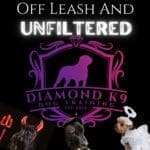Stop the Trade Game: How to End Bribes, Teach “Out,” and Fix Resource Problems

/
RSS Feed
In this episode of Off Leash and Unfiltered, Kati Peppe—owner of Diamond K9 Dog Training in Biddeford, Maine—dives into the “trade game” most owners play when a dog won’t give up an item. She explains why bribing with food reinforces the very behavior you’re trying to stop, when to correct directly (for never-allowed behaviors), and how to teach a clean, accountable out so your dog drops and moves off resources on command.
Episode Highlights
- Bribes backfire: Showing food before the behavior changes links “refuse to give it up → get paid.” That’s why the trade game keeps you stuck.
- Natural ≠ acceptable: Guarding and keep-away are normal dog behaviors—but unsafe in homes. They require clear rules and accountability.
- Two lanes, simple rules: If it’s never allowed (trash, socks, counter items), correct the act directly—don’t cue “leave it” and feed.
- Teach a real out: For allowed items (bone/toy) you may need back, install a command: drop the item and move away, then add meaningful follow-through.
- Reward vs. bribe: Rewards come after compliance (cookie appears after “out” happens). Bribes appear first and poison reliability.
- Quit the nagging: “No” → consequence ends rehearsed behaviors so you’re not managing with endless “leave it, sit, ah-ah” all day.
- Puppy mouthing: Correct briefly and clearly (e.g., towel bonk after “No”), then offer a chew. Skipping the correction teaches “bite → get toy.”
Minute-by-Minute Breakdown
- 00:29 – Who we are: Diamond K9; off-leash obedience, behavior work, puppies.
- 01:17 – The problem: item control—can you take things from your dog without a rodeo?
- 01:47 – Keep-away and clutching items vs. true guarding (higher stakes).
- 02:45 – Why the trade game is so common—and why it isn’t a solution.
- 04:00 – Guarding is natural, but not acceptable; safety first.
- 04:53 – Logic check: produce bacon after refusal = you just reinforced refusal.
- 06:46 – The second the reward appears, the wrong behavior is on “record.”
- 08:26 – Danger: bribing a guarding dog (growl → food) escalates risk.
- 09:33 – Direct conversation for never-allowed behaviors—no cueing your way out.
- 10:36 – Teaching out: drop item and move off; later add fair corrections for non-compliance.
- 12:18 – Why “leave it” isn’t for things that must never happen.
- 12:43 – The “leave it, leave it…” spiral—how cueing + food builds the wrong loop.
- 13:25 – Keep it simple: mark “No,” then deliver a meaningful consequence.
- 14:28 – Sequence matters: No → correction (not simultaneous).
- 15:54 – Ditch constant management; aim for durable change.
- 17:20 – Bribe vs. reward demo: cookie shows up only after correct response.
- 18:44 – Reliability test: will your dog comply when no food is visible?
- 20:50 – Dogs aren’t “eager to please”—they follow patterns that pay.
- 21:44 – Why the trade game worsens frequency and intensity over time.
- 22:40 – Redirection myth with puppies: biting people → toy = stronger biting loop.
- 23:32 – How to stop mouthing: “No,” then firm towel bonk; then provide a chew.
- 25:35 – Don’t skip the boundary talk; set people-rules early.
- 26:31 – Balanced relationship: structure, yes—and lots of affection after boundaries are clear.
- 28:19 – Why “positive-only” for stopping behaviors drags problems out (or grows them).
- 29:04 – Recap: no bribes; correct never-allowed acts; teach out for allowed items; reward after, not before.